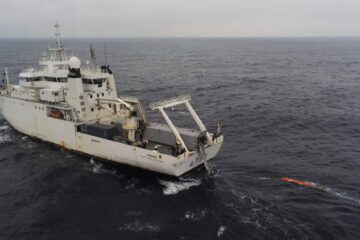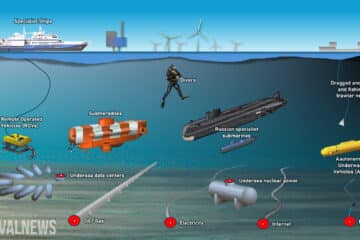The Nordstream 1 and 2 gas pipelines in the Baltic Sea both suffered ruptures in recent weeks. The cause of the ruptures currently is unknown but is being investigated.
In its March 2021 Defence Command Paper (DCP), the UK announced plans to develop MROSS to augment at-sea surveillance capacity in order to protect critical national infrastructure (CNI) on the seabed and detect wider threats in the North Atlantic. The DCP noted, in particular, Russian capability to threaten seabed cables.
Speaking at the Conservative Party annual conference in Birmingham, UK on 3 October, Wallace underscored Western reliance on seabed pipelines and cables to provide energy and information, and pointed to Russian focus on targeting such infrastructure.
“For that reason, I can announce that we have recently committed to two specialist ships with the capability to keep our cables and pipelines safe. The first multi-role survey ship for seabed warfare will be purchased by the end of this year, fitted out here in the UK, and in operation before the end of next year. The second ship will be built in the UK, and we will plan to make sure it covers all our vulnerabilities.”
Ben Wallace, UK Defence Secretary
In other words, the first MROSS platform will be a commercial or other vessel procured off the shelf on the international market and given a relevant equipment fit in the UK, to help meet an urgent at-sea surveillance capability requirement. The second ship will be a bespoke, UK-built vessel.

While no evidence has yet been revealed publicly on the cause of the ruptures to the Nordstream pipelines, seismic data indicated explosions had occurred, a NATO statement referred to the incident as a deliberate act of sabotage, and numerous regional countries – including France, Germany, Norway, and the UK – stepped up national and multinational naval patrols over key underwater CNI nodes.
From the UK’s perspective, Wallace was clear on the cause, pointing at Russian president Vladimir Putin. “Putin’s reactions are wider than just Ukraine. His reach goes further. This week, we saw the ‘mysterious’ damage inflicted to the Nordstream pipelines,” Wallace told the conference.
Back in November 2021, in a written response to a Parliamentary question on MROSS, UK defence procurement minister Jeremy Quin confirmed the MROSS programme was in its concept and assessment phase, with decisions on procurement strategies, project schedules, and entry into service timeframes still to be taken. As regards capability, the primary, significant benefits of MROSS will be its surveillance role and the deterrent presence this will generate. Given the incidents in the Baltic Sea, meeting that surveillance requirement appears to have become more pressing, perhaps prompting the UK’s pursuit of the commercial off-the-shelf interim option.






